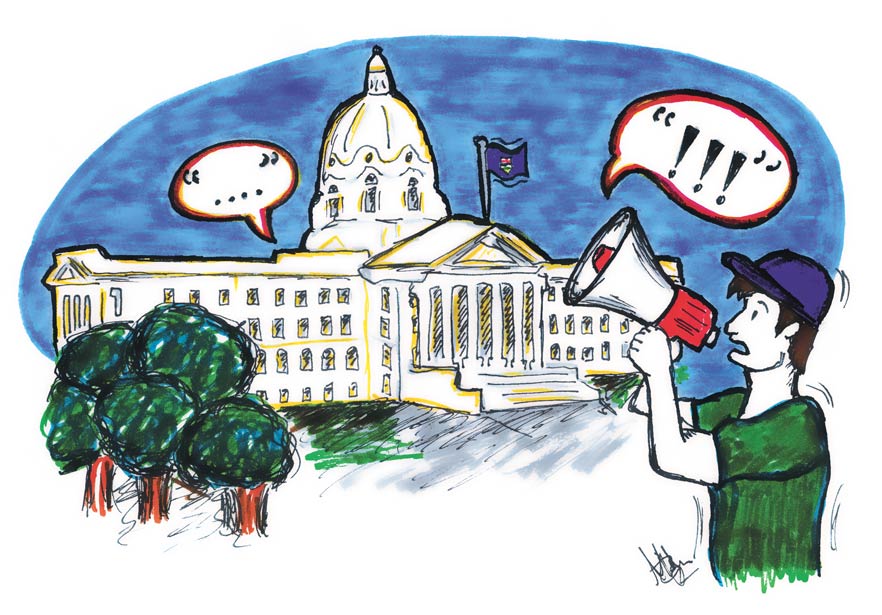
Student apathy hurts our political efforts
By Kate Jacobson, November 27 2014 —
Students have a difficult time being heard in Alberta’s legislative assembly.
Brian Mason, the former leader of Alberta’s New Democrat Party, offers the most consistent support to students of any Albertan politician. He recently spent time in question period grilling Minister of Advanced Education Donald Scott over the 2006 tuition cap, which ties tuition hikes in Alberta to the rate of inflation.
Market modifiers are a way for the government to get around this cap. By allowing universities to propose specific fee increases for faculties with a perceived higher earning potential — like engineering or commerce — the government gives administrators a legal way to raise tuition.
Like all Alberta ministers, Scott is a member of the Progressive Conservative party. He’s good at dodging questions about how the government managed to circumvent the tuition cap by accepting market modifier proposals, and his relationship with students is rocky. The minister who held his portfolio before him, Thomas Lukaszuk, was the face of unexpected budget cuts in 2013. Before him there was Doug Horner, who called the market modifiers introduced in 2010 a “one-time tuition correction.”
Administration doesn’t even have to use market modifiers to raise tuition. The compulsory fees known as mandatory non-instructional fees aren’t regulated by the provincial government. Alberta has the highest mandatory non-instructional fees in all of Canada. For students trying to negotiate with the provincial government, it’s been a long period of bald-faced lies and poor consultation.
When University of Calgary students went to Edmonton to protest market modifiers, it was opposition MP’s that came out of the legislature to speak with them. Scott showed his face, but ignored students to speak with the media.
It’s good to have the support of opposition leaders. It’s comforting to know that the Liberals, Wildrose, and the NDP have all released detailed strategies for post-secondary education that reject market modifiers.
It’s not like politicians from those parties agree on a lot of issues either. Brian Mason and Danielle Smith — leader of the Wildrose Party, the legislature’s most conservative political party — are at odds on almost every issue. When it comes to students, it seems like everyone is united, or at least ready to listen, except the ruling party.
Provincial politicians in office have little incentive to listen to students. We don’t have a lot of money or power and we rarely show up to the polls. When we do organize, like at the Nov. 18 march on the provincial legislature, the results are less than inspiring. Only 400 students showed up. I’ve sat in lecture theatres for introductory economics classes with more of my peers.
It’s easy to lay the blame for student apathy on politicians. The government rarely listens to students. Our lobbying efforts are more about the provincial government having a chance to show that they consult with students than considering our priorities. This year’s consultation process over market modifiers has been particularly bad, both with administration and the provincial government.
But it’s time students shouldered some of the blame for the lack of interest that politicians have in student issues. We’re not engaged. Our efforts to prove that we matter are poorly attended. We have to make sure that what we’re saying is important before we complain that our provincial leaders aren’t listening to us.
In an ideal world, we wouldn’t have to prove that student concerns are valid. We would be treated fairly and listened to by virtue of being part of Albertan society. But we don’t live in that world. And the burden for making sure that it’s easier for the next generation of students is on all of us, no matter how frustrating and inconvenient that burden is.
Complaining about provincial politics is easy. But anger isn’t a helpful emotion unless it’s used for something. Useful anger is when students support each other and talk with their MLA’s. It’s when we refuse to stop talking about issues just because they become boring and drawn out and it’s when students make it so difficult for our political leaders that listening to us is no longer an option.
Four hundred students outside the provincial legislature for an hour is a good start. But it’s easy to forget. If we want to be part of provincial politics, our efforts need to be consistent. We can demand that our voices be heard, but we also need to make sure that what we’re saying matters.
